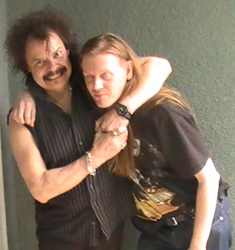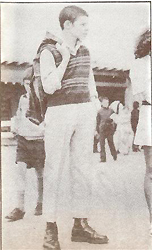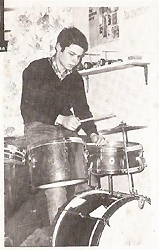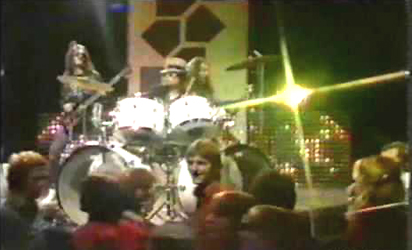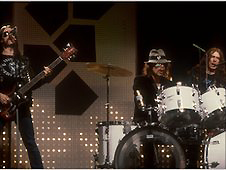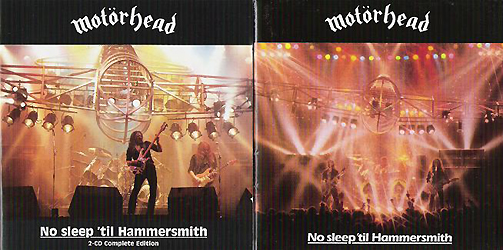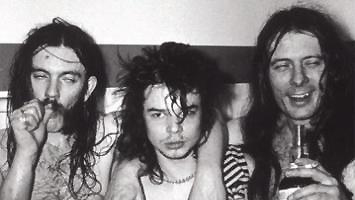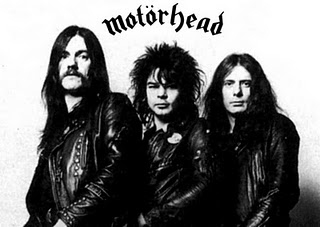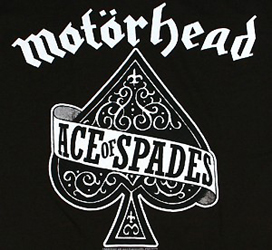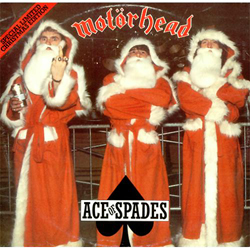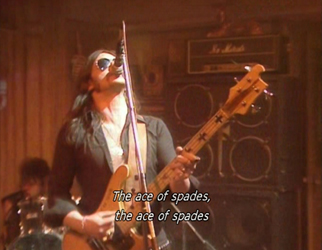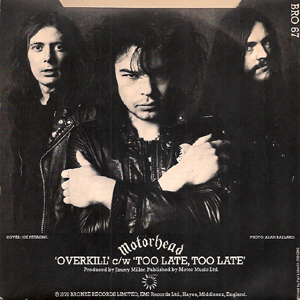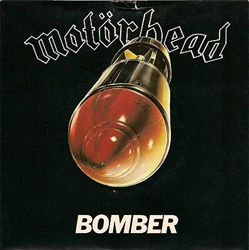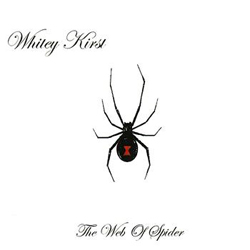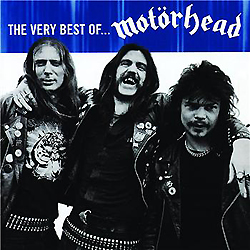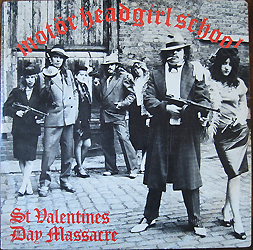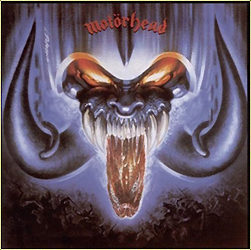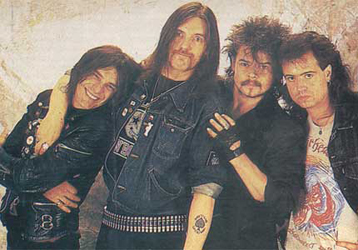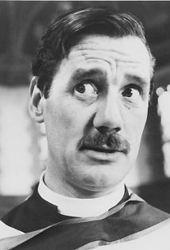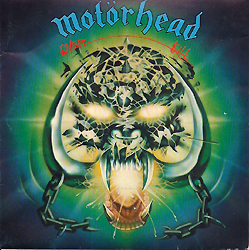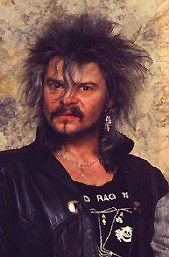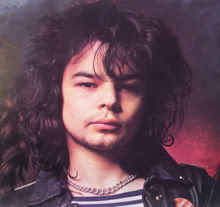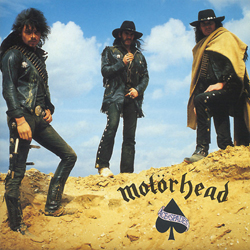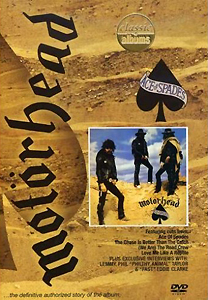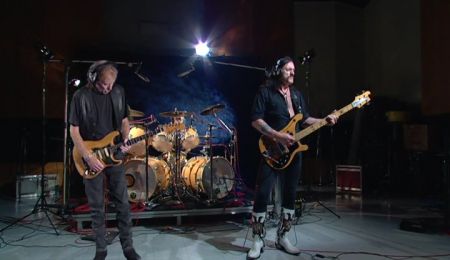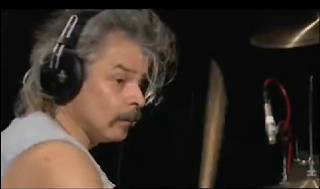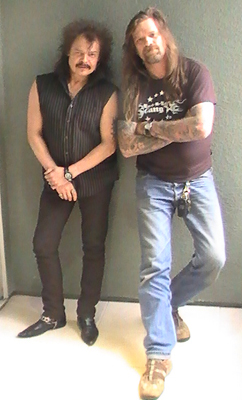|
An Interview with 'Philthy' Phil Taylor
(Former Drummer of Motorhead) that took place in Los Angeles on 5th & 6th April, 2011 by Glenn Milligan Phil: Well here we are. Glenn: Here we are. So originally, what made you wanna play drums? Phil: Well I never really wanted to play drums. I used to bang about on pots and pans with knitting needles or my hands when I was a kid. Then when I got to be about 13 or 14 - at that age when you hate your parents and you hate your world and you hate everything, I was a skinhead and doing a lot of fighting and stuff like that and my dad kept having to come down to Leed Police Station and get me out of jail for getting arrested as a juvenile for fighting and stuff. So one day he came with a beat up old snare drum and said, "If you're gonna be like that you can take your agression out on this", and he forbid me from going out for two months or something. He booked me one month of drumming lessons at Leeds Music College - one lesson a week. I wasn't looking forward to that but I went and my drum teacher said that I had a good, natural ability and that I should continue doing it. I found I was enjoying it, so that's how that happened basically. It was either mindless violence or playing the drums. I remember one funny thing that my drum teacher said to me once because I also wanted to be a boxer and I was training to be a boxer for this stupid little fight club. I had this fight one time and I came to a drum lesson and I had a black eye and a fat lip because I lost. The drum teacher looked at me and he went, "What the bloody hell have you been doing? You know what Phil, you should stick to drums lad". He said, "You can hit 'em as hard as you like and they don't hit you back"
Glenn: That's true. (We laugh) Phil: And I though, 'Oh yeah - that makes sense'. Glenn: Yeah. Phil: So that was about it for me. So that made my mind up there. I never even thought about being a professional. I just really enjoyed it and then carried on with the lessons and then after the official lessons had stopped my teacher then gave me private lessons at his house that went on for a year or something like that. He was a military man - he was 90 when he was giving me lessons and he was a drummer boy in the 1st World War and he was from Leeds and went he went to war, when he went over to France he was only one out of, I think he said him and 6 of his friends were the only ones who came back out of hundreds and he was the drummer boy playing his drum, like marching out over the top. He said it was unbelievable. "I couldn't believe it", he said, "Bullets flying past me, people firing their arms, I was playing away like mad and nothing ever hit me, I never got injured or anything", you know?
Glenn: Yeah. Phil: He was a great old guy. George his name was. So I carried on for about a year doing that. Of course he always told me that, "Don't go into that there, what they call it 'Rock 'N' Roll, you don't wanna be doing all that - stick to your military beats", because he was just tandom military stuff. But when I wasn't taking my lessons I was into playing rock stuff and I used to save my money and everytime I'd got enough I would buy another beat up old drum or beat up old cymbal until I got a reasonable drum kit together. Then I set up in my bedroom and I just used to thrash about listen to records and imitate them. I don't think I told anybody and I think I'd been playing for about 3 years before I told any of my friends that I played drums. One of my friends that I bumped into on the way back from school - he had a guitar case with him or something and he was saying he was a guitar player and he had a band and did I know any drummers? And that's when I thought, "Mmm", so that was my first admission that I played drums and I got together with him and that was quite fun. But I never actually played. My 1st professional gig was when I was 18, which was on a cruise ship. Glenn: Haha - a cruise ship? Phil: Yeah from London to the Canary Isles for three weeks with a week in Tenerife or somewhere in the Canary Isles. That was quite interesting - especially at the end when I got ripped off because there were these two old guys - an organ player and a double bass player - they were both like in their forties and just playing, you know, just real slow dance music and 3/4's you know and all kinds of stuff because the patrons of the cruise were all like middle aged ladies looking for love or romance or whatever on this beat-up, old tramp f*ck*n' steamer. I was supposed to get paid something like £40 a week or something and when the ship got back into port, I remember waking up and looking around the boat for the other two guys as the keyboard player was supposed to give me my money and they'd both f*ck*d off! They just both f*ck*d off and left me in London with no money at all - f*ck*n' I had a return, I had a return train ticket and I had my drums. I had 3 toms, a floor tom, a snare drum, 2 cymbals and a high-hat and they were all in fabric cases and I had like two over this arm, two under that arm, two over this arm, two under that arm and I had my cybals in another case and got them all on the train. Glenn: It must have weighed a ton? Phil: Oh it did yeah. Well the thing is, I didn't have to carry it very far because there were plenty of taxis on the quayside by the ship. Glenn: So I guess that was your 1st opening to the crooks in the music business. Phil: Yes it was yeah - my very 1st job and I got ripped off. What I remember, it was quite funny though because I was only 18 and there was these f*ck*n' old boilers trying desperately to f*ck ya. It was f*ck*n' 'orrible. I mean the youngest one one the ship must have been about, well she seemed old to me because I was 18, was probably about 29. But I wasn't interested - I had a girlfriend back in Leeds but it was so funny because going through the Bay of Biscay which is always quite rough and back in them days, the cymbal stands were just a straight up stand with 3 little legs pushed in the floor. The ships going like this (does hand movements) and everything's swaying about and the cymbal stands are almost ready to fall over. At one point, the cymbal stand on my right, it was definately gonna fall over and I reached out to grab it and the ship suddenly went even more and I fell straight through the drum kit into the piano player. (I laugh) Ridiculous. That was fun. Glenn: Yeah that's Spinal Tap. Phil: I had to wear a suit and all that. Glenn: Wow. Phil: I got some photos of me in that suit somewhere. Glenn: Who would you say your favourite drummers were when you first got going and why? Phil: Well I didn't really have a favourite drummer and I haven't really. I mean every drummer that I ever listen to had something that the other drummers didn't or did something that no other drummer did. Do you know what I mean? Glenn: Yeah. Phil: I'd never been to a live gig. I'd never seen a rock band live or anything like that and my dad was a big jazz fan. He had Gene Krupa records and Buddy Rich so I was kind of weaned on that kind of thing but I didn't so much like the music that they played so I'd listen to the drums. I suppose in the early days it'd be Gene Krupa and Buddy Rich and a few other jazz drummers that I can't remember the names of but I wouldn't really say they are favourites. But I would listen and pick up little things here and there that they do and incorporate them into whatever I was playing. Later on when I discovered Jimi Hendrix and took my 1st acid tab and I was into Mitch Mitchell - he was a good drummer - he was a jazz drummer but he was a good drummer. Keith Moon - I think he was great because he was a nutcase and he was good drummer; John Bonham of course, Ian Paice was one of my favourite drummers definately above all the rest because he was so good. I remember seeinf Deep Purple at Leeds Town Hall and I was in the cheap seats behind the stage. I remeber just sitting there watching him - watching his foot and man that guy's got such a fast foot - f*ck*n' unbelievable some of the stuff he was doin' - it was amazing. It made me wanna stop playin' (laughs). But I didn't - he's really good, really good. I used to like Steve Upton who played for Wishbone Ash - he was good. Stewart Copeland - he's good. Lots of drummers are, I like. It all depends what they are playing because I never particularly listen to just the drumming - I listen to the music. Any drummer can paly 'bum chi bum bum ba booby booby booby booby dum' but it's the way you play it or the way you don't play it. Or more is less, the better you know, the more whatever, you know? Glenn: It makes sense. What would you say it was like when you 1st got into that professional status with Motorhead? Phil: You mean like 1st time on Top Of The Pops etc? Glenn: Yeah.
('Bomber' on BBC's 'Top Of The Pops') Phil: Well it was great because we did and we thought we were all gonna be millionaires. It was great to know that so many people would come and see you and really liked your music - that was the best thing for me. Not just being adored or revered or praised as a rock star or anything but the fact that people actually just liked what we were playing was what made me happy. We never thought about money because we were always too f*ck*n' busy and our rip-off Manager, Doug Smith whereever you are you b*st*rd, I hope you die and f*ck*n' rot in hell you sh*tb*g kept us busy all the time. I mean we were probably on the road 9 months out of the year and then we weren't, we'd come off the road, have a couple of days off, in the studio to write another album, then in the recording studio to record it, then have a couple of days off and then back out on the road again. I mean in the late 70's and all through the 80's, I think we were one of the hardest working bands in the world probably.
('Overkill' On BBC's 'Top Of The Pops') It wasn't as if all of a sudden, when we were on 'Top Of The Pops' and getting singles in the charts and having a number 1 album, 'No Sleep 'til Hammersmith' the money came rolling in because it didn't - not 1 penny. None of us could suddenly go out and buy a f*ck*n' Lamborgini or a big house in the country - no - no chance - so there was no money at all involved at all. Not nothing - zilch. I mean, we could stop squatting - we didn't have to squat anymore and I was sensible. I bought a place in Worlds End in Chelsea in 1980 - I've finished paying for the mortgage now and it's worth a f*ck*ng ridiculous amount of money now compared to what I payed for it. But that was the only thing I could afford to do and that was just pay my mortgage off. It's only since I've been living here in America, not that America's got anything to do with it but it's the time period because as time goes by your original contracts state that you get more money for each renewal period and now we are on something like 90% so I'm making more money than I ever did in my life - not that I'm a millionaire or anything like that but I'm certainly comfortable yeah - and it's about f*ck*n' time!! (We laugh)
Glenn: What would you say your favourite tours were? Phil: We did so many that some of them I can't even remember. I mean I bump into people here in LA and they say, "hello I'm so and so, I used to play with.. we toured with you on...", "Oh really - oh, was it good?". I mean it goes by and when you are working that much everything goes by in a blur. It wasn't like we had any time off to go out exploring the cities we were playing. Most of the time we were on a bus, we'd get on the bus after a gig, drive all night long, wake up outside the venue on the bus, go inside the venue, get a shower or whatever, do the gig and same thing again. So you never really get to see very much and the only people you met were the support bands. That was about it. I mean, we had a lot of fun on the road but not as much fun as some of the other guys in some of the other bands because I don't know why but strangely enough Motorhead and quite a lot of Heavy Metal bands, for some reason attract.. the vast majority of the audience are all young guys. So there wasn't exactly a lot of groupies around and when there was any around, they didn't last long, it was like 'Ahhhh'.
Glenn: Monsters? Phil: So from that point of view as regards to going around the world and f*ck*ng everything in a skirt - it wasn't that great but it was a lot of fun. Sometimes if somebody says, "But don't you remember that time..", and I'm like, "Oh yeah", and I'll remember it but just thinking to myself, like what can I think of, you know? I can't think of anything. If somebody were to phone up and say, "Hey Philthy, can you name the 40 or 20 most outrageous or fun things that you did like on the road one time", that'd be hard. I'd have to be phoning up (Fast) Eddie (Clarke) and saying, "Eddie, Eddie, do you remember?", because Eddie's got a really good memory, he remembers stuff like that. I mean I remember more stuff from the early days from like before we got like on 'Top Of The Pops' and before the 1st album came out when we were still playing small clubs and building up our following - I remember a lot of funny things from them days but then once it started to get big and we were in tour buses and staying in hotels and that, then it kinda got boring because you were kind of distanced from your fans, so to speak, but not that we wanted to be but you can't handle a hundred kids who want to talk to you all the time so you have to avoid 'em. Not that we wanted to but you just can't.. sure you can talk to one person, 1 or 2 people or whatever but you can't talk to 50 people all at once. Glenn: Nightmare - it's bad enough being interviewed by 4 people at once - you can't do that sh*t. Phil: Well I don't mind as long as they ask their questions at different times.
Glenn: Yeah I can understand that - why people keep out the way a lot and they don't wanna get too involved with the fanbase. The fans think they own them - all that sort of sh*t goes on. Phil: Yeah well fromm a point of view of the musician, the star or whatever you wanna call him, it's a fact of life. Once you become very famous and you're playing to 20,000 people a night in arenas or whatever, you can't. It's impossible to have any personal contact with your fans because you can't have a conversation with one guy and then not have a conversation with everybody else - I mean, it's just impossible. So it's a matter of circumstance really, circumstance forces that issue of you becoming more of a recluse, like having to hide away in hotels and dodge people. But it was always good fun when we did In-stores like we did a lot of them before a gig. We had to go to a local store or something like that and there'd be hundreds and hundreds of kids coming in and we'd be signing stuff. At least you get to chat to a few of 'em then and they tell you what they liked and what they didn't like - that was cool. Glenn: So I guess you learnt more about your fans and about your music than what you knew about it, because you're in that void aren't you as well? Phil: Yeah, I mean obviously when you start selling more records, you know by the amount of records that you sell that obviously it's good. Let's say if you sell 100,000 records of your latest album, well then you know that 100,000 people hopefully will like it - so that's good. Why they like it I never thought of asking that question because I don't think you can answer that question. It's like asking me, why do you like the album? I dont know, maybe a fan can answer it but I couldn't. I mean I can't answer why do you like this song or why do you like that song? I don't know. Glenn: It's like, why did the 'Ace Of Spades' become such a massive hit? Phil: I mean yeah, that's to be honest, seeing as you mentioned it, that surprises the sh*t out of me cos I paid no more attention to that song than a piece of sh*t. Glenn: Yeah. Phil: To be honest, it was an ordinary, run of the mill number started off by Lemmy with his bass chords and I didn't think it was that great really and yet it seems to have become, here in America anyway the one number that everybody knows of Motorhead. I think that was possibly because we did that one stint on 'The Young Ones' show, remember 'The Young Ones'? Glenn: Yeah, yeah. Phil: ..And then that was syndicated over here in America - that's when alot of people got exposed to Motorhead, so that's why I think 'Ace Of Spades' . But if as many people over here who liked that song went out and bought it, we'd be a lot richer. (We laugh)
Glenn: What was it like playing on 'The Young Ones'? Was it a strange.. did you just go in, mime it and get out or did you all hang out and stuff with Rik Mayall, Ade Edmondson etc or was it a case of like just business? Phil: Oh no, they were all cool because they were actually all fans of Motorhead. Well all the bands that were on that show were on at their request because that's the sort of music they liked. Glenn: Yeah. Phil: No they were cool. They were very nice people in fact. They were more shy of us because they were thinking that we were all like Hell's Angels or something and that we were gonna come and beat them up or something and demanding rock stars at 'em and of course we weren't and no they turned out to be really nice people but of course they were very busy and during the making of a show you can't talk to people that much but through that show they invited us to a studio - Island Studios in London where they were doing some charity record with Brian May from Queen and a couple of other people and Rik Mayall I think was singing on it. I didn't play drums on it, I know that.
Glenn: Was it 'Bad News'? Phil: It might have been, I'm not sure. You know I can't remember. All I remember is going into the studio and hanging out and Rik Mayall doing the most funny impressions of... well not impressions but just different characters that you've never sween before - he's so funny that guy. Glenn: I saw Adrian Edmondson at The Boardwalk in Sheffield. Phil: What they all doing now? Glenn: Well I actually saw Ade Edmondson with his Bad Shepherds - it's like a folky thing and they actually do 'Ace Of Spades' in the set. Phil: It's a band is it? Glenn: Yeah. Phil: Oh right because over here in America unless there's an American involved you don't hear about it. I get most of my news off the Internet through the BBC World Service and stuff like that. Glenn: What would you say your favourite songs are that you drummed on and been part of and why? Phil: Well most of those would be Motorhead songs - Overkill, Bomber, Stay Clean, The Chase Is Better Than The Catch. I mean I liked 'em all really because I enjoyed playing the drums and being in a three-piece band you have to work a bit harder than if you are in a four or five piece band because there's gaps and if you are in Motorhead you have tom work even harder because there's no bass player.
Lemmy's not a bass player - he's a f*ck*n' guitar player playing a bass and there's no bottom end there so I do a lot more tom fills than other drummers but I enjoyed playing that. I enjoyed playing 'em all and then since I left I enjoyed playing with Whitey Kirst on 'Web Of A Spider' - that was a good song but disappeard into oblivion. I'm enjoying the stuff I'm doing with Chris (Holmes) as well - that's pretty good. Hopefully we are gonna try and get that released somehow, somewhere.
Glenn: How did it come about playing with Whitey, the guitarist from Iggy Pop's band - did you just meet? Phil: Well I actually met Whitey at the Motorhead 35th Anniversary show at the Wiltern Theater here in LA and I just met him backstage with his bass player and we got on like a house on fire. We just got on really well and he was living in an old wharehouse down in Venice Beach that his sister owned and he had a little guitar set up and I had an electronic drum kit. so he invited me down there for a jam with him and the bass player and I did and that's how that got working. Before that I'd never met him. Glenn: If you had the chance to do a duet with any particular drummers who would you like it to be? Phil: I wouldn't. Glenn: You wouldn't? Phil: No, I mean there's one thing about being a drummer - one is enough - one drummer is enough. Now two guitar players, now that's beautiful like Thin Lizzy - classic, Steely Dan - that's the only 2 bands I can think of really or sometimes Lynyrd Skynyrd - that's nice as they can play harmonies. Drummers can't.. you can't have one drum kit tuned like this and another tuned like that - it sounds like sh*t and 2 drummers with 2 drum kits sounding exactly the same - what's the point? I don't see the point. I just don't see the point so my answer to that would be no and it's got nothing to do with who would be the best drummer or anything like that because I don't think there's any such thing as the best of this - the best drummer, the best guitar player, the best bass player, the best.. I mean after all f*ck*n' ell Sid Viscious was voted the best bass player in 1980 something and he couldn't even play a bloody note. So no, I would never do that. I mean, maybe if it was a charity thing, a big charity thing and somebody asked me to go up and play on a couple of numbers, then yeah, maybe? Probably not. Glenn: If you had the chance to play with other bands who you like them to be? Phil: I would love to have played with The Police. Glenn: Yeah? Phil: Yeah they were a f*ck*n' great band. Led Zeppelin - I mean everybody would have liked to have played with them. Ozzy - I would have like dto have played with Ozzy because in his earlier days his 1st few albums were really good and he's a great guy is Ozzy. I've heard so many bands over the years. I was always happy playing in Motorhead. I never thought about leaving and playing with anyone else and since I left I haven't. Glenn: I read that as well - the fact that you never played with other bands because you were so happy playing with Motorhead that you just preferred to like.. Phil: When I was in Motorhead you mean?
Glenn: Yeah or after because I read that you missed Motorhead so much. Phil: Well to be honest when I was in Motorhead, we were working so hard we never really had chance to play with anyone else and we were more of a fans band than a musicians band. I don't think many other musicians looked upon us as being great musicians even though we had a lot of fans but that's ok. I don't recall ever being asked to play with anybody apart from Girlschool and they were managed by our Manager andthat was about it. Then after I split with Motorhead, the only type of bands that asked me, "Will I join 'em?", were bands that sounded like Motorhead and I didn't wanna know about that. I'd been doing it for 18 years. I wanted to play something a bit slower.
Glenn: I guess you got typecasted and stereotyped as just being... Phil: Well it's like being Ken Barlow in 'Coronation Street'. Ken Barlow leaves 'Coronation Street' and his secret dream is to play 'Othello'. "Nope - sorry, you're Ken Barlow", and that's what I think it turned out to be like for me and I can say that now but it's taken me a long time to realise that. I mean I must admit - call it lazy or whatever I don't know but I never went out of my way looking to join another band because I was pretty upset when I parted company with Motorhead because of the circumstances. Glenn: So when you were in Motorhead, were you hanging out a lot together or just keep separate? Phil: Oh no, I mean in the early days... Glenn: You were a big gang of friends? Phil: Yeah. In the early days, me and Lemmy we didn't have permanent girlfriends and Eddie did - he had a permanent girlfriend that he lived with but me and Lemmy were like a two-headed monster. We used to go everywhere together in London and it was great fun. Even after the 1st couple of albums we'd go out together and have fun. Then it all kinda stopped after Rock 'N' Roll probably because I got a girlfriend and I lived with her so I stopped going out clubbing so much because I was faith to her.
Glenn: When you mention 'Rock 'n' Roll, that was the 1st album I heard of Motorhead as a mate brought it round with 'The Wolf' and 'Eat The Rich' on there. Phil: That was me howling on that (TheWolf). Glenn: Was it? (We start howling). I noticed you had Michael Palin on there - what was he like to work with? Phil: It was very funny meeting Michael Palin - he was great. He turned up at the studio to do it in his cricket outfit because it was on a sunday and he'd been playing cricket and he just jumpred in his car and come to the studio and he still had his cricket pads and his white shirt and everything. It was f*ck*in' funny though - really funny. He didn't stay very long. "So what sort of thing do you went me to do then boys?" And when he just spoke, he just cracked you up because he sounded just like one of his characters. "Oh something like, 'Oh Lord, bless this..". "Yeah - that's it, that's it", and we were laughing and he just went in the studio and just made it up off the top of his head and did it in 1 take and went, "Was that alright then? Was that the sort of thing you want?". "Yeah, that was great!". "Ok, well I simply must run, I got to get home", and that was it - he was great. Glenn: Who came up with the idea of having Michael on the album like that because it's bizarre? Phil: Well we were all big Monty Python fans in Motorhead and we just thought it'd be just fun to have Michael Palin because he was our favourite one out of 'em all. I think he was the best out of all the Python team because he was really good at doing - well he could do just about any accent. He was convincing in whatever.. whether he was being the the shakey taylor, the insurance man or the vicar or the schoolboy - he was just very versatile and good. So we thought it would be funny and the fans would like it - well I know we'll like and the the fans would probably like it as well and I guess they did.
Glenn: I mean the album has got some some good songs on it like '(Don't boogie with) The Boogie Man'... Phil: Yeah, I mean Lemmy always written great lyrics. They were virtually always the last thing to be written and he'd usually just write them on a scrap of paper or a brown paper bag or whatever in the studio whiole the recording was going on and that'd be it. He just got a stream of consciousness and it'd come out good all the time. He does a lot of lyrics about war these days and at every interview he'd always bring up Nazi Germany somehow - everywhere you were. You could be in Belgium and they'd ask, "So Lemmy what was it like when you were driving through the mountains to get here?, "Well you know what, did you know that the Belgians had an SS Unit right across the road from this very gig". And I'd go, "Oh God, here we go, I'll come back in half an hour", and of course none of it would get printed about Nazis etc - It just got very boring after so many years - very boring. When I 1st met him it was like a little hobby becaise he had a beat up leather jacket with a Swass Sticket on it and that was about all. Glenn: What were your favourite Motorhead albums? Phil: Favourite Motorhead albums? Glenn: Yeah. Phil: The ones I played on. If I had to pick a favourite out of the ones I played on it would probably be 'Overkill' - it had the best songs on it I think.
Glenn: You got to do more on there - a bit more intricate.. Phil: I suppose I did really yeah. You could say that. Glenn: Did you ever get sick of the style of the songs and thought, I fancy doing something a bit slower and a bit more chilled out because they always very Lemmy orientated? Phil: it was yeah. Well if you're a Motorhead fan and you've got lots of Motorhead records - think of how many Motorhead songs have got the same bass lick going all the way through it. It's almost the same thing through every song and it's down to the guitar player and then what the drummer plays to bring out a melody or whatever but of course Lemmy sings the melody - but yeah it had to be Lemmy or it had to be 1,2,3,4!! and that it - the end. I mean the few slow songs, if you can call them slow songs that we did do were written by me and Eddie, you like 'The Chase Is Better Than The Catch' and there was another one when Phil Campbell and Wurzel were in the band called 'Love Me Forever' - that was another slow one. But of course, by the time we got to playing on stage they all became twice as fast. He'd speed them up. He's turn around to me and go "Faster, Faster". We used to get into such arguments when we came off stage and I'd go, "What the f*ck is wrong with you man?, I was playing too slow, you were playing way too fast", "Listen man, I don;t play too fast, you play too slow!". It was always the same. It was never his fault. I mean anything that went wrong or a bad decisions that was made - it was never his fault. Not ever, not once. In the band if there was any problems or debates on how a song should go or how this should go or how that should go or artwork or stuff like that I always voiced my opinion because after all it was a democracy and if I didn't like something I would say so. Most of the time we always got ignored. That was also the fault of record companies and management. I had an arugument with Lemmy in Tokyo about the democracy in the band and he said that decisions in the band were a demoncracy when he said so. That was the beginning of the end for me. Glenn: So what sort of things were you doing after you left the band? Phil: I didn't do anything. Probably for a few years I was too busy chasing women and having a good time being here because I was in LA when we parted company and so I decided to stay. I moved in with this chick and just had a good time going out clubbing and getting drunk, getting stoned and enjoyed the American life. I didn't do nothing really. Nobody asked me to join a band. I didn't hear of any bands that needed a drummer that I liked so I really just became a man of leisure. Then I got bored with that and then the electronic age came in and Roland came out with an electronic drum kit. I always hated electronic just because of my age and my era that I came from is all very anti-electonic. You think of electric drums when I was younger and I just though electric drums used to go 'mo, mo, mo, mo , mo ,mo' (done in falsetto sound) and that was electric drums.
Glenn: Yeah - that 'Top Of The Pops' sound. Phil: Exactly. But I did more research into it and I bought magazines and went a seen bands and talked to people about what they were using and what this did and that did and I bought myself a Roland TD5 - one of the 1st kits they brought out and it was f*ck*n' great. It sounded like an electric kit but not 'bu-bu, bu-bu , bu' (done in falsetto sound), you know, but it was really good. So I got into that and I had a little studio at an apartment that I had back in 96 to 2002 or something. It had a big walk-in closet and I turned that into a studio. I also got into computers. I taught myself computers. I built my own computer systems - learnt how to out them together and that. I wouldn't say program them but I can certainly build.. well I built my own computers - all of them were built by me. But that's not difficult - you just buy the parts and put 'em in but configuring them is what's difficult. Then I started off with a thing called 'Session 8' which was one of the very 1st electronic computer studio set-ups. It worked on Windows 3.1 which was the very 1st Windows and the computer.. that was the only computer I ever bought - th computer cost me over $3000 and it had 32 megabyte, megabyte!! CPU and it had 4 megabytes of memory and that was like top of the line. Thats all you need too and the hard drive was 320 megabytes which would last you forever, you know! To operate this recording system it only recorded or a scusidrive and the scusidrive was about 18 inches by a foot long by about 5 inches deep and it was like a 1 gigabyte - that was like enormous. Ok, you ain't never gonna run out of space with this. That's how I got into that and I met a friend of mine called Andy CAllerin who used to play with The Pink Fairies back in England and he was living over here. We got together and did a bit of jamming. Chris (Holmes) would come over occasionally and plonk about. But masically I was just plonking about and f*ck*ng around - nothing that I could take my hat off to - just enjoying discovering different things maninly about computers. I got into playing computer games. Then I met this guy who owned a Corvetter Mayarta junkyard in North Hollywood and I became good friends with him and then for about 2 years I went to work every day with him in hisa shop. I wasn't gettting paid - it was just that I wanted to learn about motors. I learnt how to rebuild motors and I had had 2 corvettes at the time - an '81 and an '82. I took the motor out the 81 and rebuilt it into a 383 stroker which is a nice motor and taught myself that. I must say I am quite a dab-hand on Corvettes between the years '68 and '82. Then when computers came in it all changed because you can't f*ck with 'em.
Glenn: Yeah, it's all done with computers. Phil: I mean any car these days or any car going back ten years - you've gotta have a computer that you've gotta hook it up to, to tell you what's wrong. You might know what's wrong, say if it's missing - know, obviously check the wires 1st, check the plug wires but if it's not that - oh o, what could it be and of course it's always something to do with the computer then - there's a sensor that's gone. Like a sensor that monitors the air filter or the amount of air that's coming through the air filter might have gone funny and that's sending a signal to the main computer and then the computer gets that signal, it sends wrong signals to all the rest of the car which makes it run funny. So the way the car's running might.. I mean in the old days when it was just a carburettor and the basics - if your car was missing, it was one of four or five things - it was either the pluig had gone, it was either the wires, something wrong with the distributor or you've run out of gas. It was just a matter of just following the trail - now you can't do nothing. Not that there's anything wrong with that - I mean, I've got a 2000 'Vette which I like very much. But the only time I open the hood is to check the oil. I think I've put oil in it 3 times since I've had it which is about 5 years. Glenn: What was it like for you when you got back with Lemmy and you did that Classic Albums Programmes for the 'Ace Of Spades' album?
Phil: With Lemmy in the studio? Glenn:Yeah. How did it come about - was it the BBC asking you to do it with Lemmy? Phil: That was OK - we were still friends then. That was when they interviewed different people about the album.
Glenn: Yeah and there's all extras like Girlschool on the DVD talking about Motorhead. Phil: You know what, I've got the DVD but I've never even watched it. I'll have to watch it some time. Yeah that was cool. I mean, I knew that they had a drum kit set up in the studio and they told us that they just wanted us to mime to a couple of songs. As it turned out, they had it all set up to record. I'm not sure if they did record or not but they superimposed.. Eddie wasn't there.. Glenn: Yeah I know. Phil: Eddie was in Spain and they superimposed him on that and of course when the interviews were over, Lemmy didn't wanna play - he wanted to get going, he wanted to go out and I was quite happy to play a few numbers. But it was cool - it was alright.
Glenn: What I liked about that was the cameraderie between you and Lem on that programme is just really... the humours there, it's so funny, you are cracking jokes to each other all the time - the stuff you were coming out with... Phil: Yeah you're right - it was. You know, I'd forgiven him and he'd put up with me or whatever, I don't know. I mean, it was never the same after I had left the band - he was always a bit stand-offish. I made the best of it and we had a good laugh and we didn't see each other that often - hardly ever really so it was goos to see him - and it was. I mean, it was pretty good fun.
Glenn: I heard him and Eddie used to fall out alot. Phil: Well we all used to fall out with each other at the same time - sometimes we'd have a three-way argument going on - f*ck knows what about - who remembers? But we always kissed and made up the next day and got on with it. Notrhing was ever that serious. Glenn: What I remember about as well because at the time you had that big calcium deposit at the back of your neck. Phil: Yeah I got rid of it. Look (Shows me where it was). Glenn: Oh yeah it's gone - nice one. Phil: Yeah I went to the cheap hospital and it was for something else that I had gone there for - I forgot what it was. While I was there I conned the doctor into, I said, "Oh by the way, have you seen this thing on the back of my neck?", "Good God, What's that?". "Oh well I broke my neck and I don't know what it is but it's been getting bigger and it's really giving me a lot of pain - do you think you could like remove it?" and he said, "Yeah sure", so a few weeks later I went up to the hospital and laid down on the table facedown and half a hour later, a bandage around my neck and it was gone. Apparently it was nothing to do with the fact that I had broke my neck - it was just a cist. Glenn: Yeah that was one of the main things I remember in the programme - this big f*ck*n' thing on the back of your neck Phil: Oh yeah, it was f*ck*n' 'orrible. I mean when it's on the back of your neck, you don't know it's there. It wasn't giving me any pain - I couldn't even feel it. I mean I used to stick pins in it, needles in it and squeeze it because I thought maybe it's full of puss. Glenn: Yeah. Phil: But nothing would ever come out of it. It wouldn't even bleed becasue it was just fat. But everytime I had a shower, I'd think f*ck*n' 'ell it's bigger. Sometimes I'd look in the mirror and think, 'God that looks f*ck*n' 'orrible - this is gonna affect me pulling women. So I took a chance on getting it done for free.. getting it removed for free and it worked. And now I'm cist-free! Glenn: It's like saying, 'I no longer have syphallis!' Phil: I've never had syphallis. Glenn: There you go. What's it like working with Chris (Holmes) - how did that come about? Phil: Oh it's great. I mean Chris is really, a really talented guitar player - he's got some very good ideas. Trouble is - he has too many ideas all at the same time sometimes. He'd rather put 8 guitars on a song and I say to him, "Chris, 4 is way plenty enough", because he can get a bit lost. I can see what's going through his mind and when you listen to some of the songs and you hear the parts he is playing, and he works it all out before. He knows exactly what he is gonna do and he works on it and then improves on it so to speak. He's easy to work with and he's good. I mean, that guy, he does nothing but play his guitar. The only time he doesn't play his guitar is when he's asleep or when he's out and he's driving his car. But he's a great guy.
After a killer Interview with Phil I then settle down and have a good chat with Mr. Holmes - talking of which, a big thankyou to Chris for setting up the Interview, and thanks to Phil for his time - it was a superb night and several beers later....! Special Thanks to Chris Holmes for taking the opening piccy with Phil as well! |
